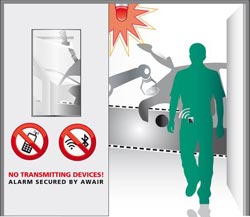Awair: Software Solution For Wireless Network Quality Monitoring

Awair acts as an early warning system by monitoring the frequency spectrum to identify potential service interruptions<br><br>©Fraunhofer ESK<br>
Wireless technologies are becoming increasingly popular for industrial applications because they are relatively low cost and offer added flexibility.
Special attention must be paid to how the various radio networks are set up however. An indispensable tool in addressing this issue is coexistence planning as detailed in the IEC/TS 62657 specification.
Awair independently uncovers and automatically reports interference by continuously monitoring key parameters within the radio spectrum and detecting abnormalities in the time and frequency domains.
Potential interference problems can thus be promptly identified and displayed, allowing them to be rectified before they lead to service interruptions. In production halls, Awair can recognize a wireless network node outage or the presence of a restricted radio device, such as a WLAN or Bluetooth® active mobile phone. Awair’s early warning system can help prevent production lines from grinding to a halt.
At the sps ipc drives in Nürnberg (November 26-28, 2013), Fraunhofer ESK will be presenting awair (hall 8, stand 8-300).
Media Contact
More Information:
http://www.esk.fraunhofer.deAll latest news from the category: Trade Fair News
Newest articles

Sea slugs inspire highly stretchable biomedical sensor
USC Viterbi School of Engineering researcher Hangbo Zhao presents findings on highly stretchable and customizable microneedles for application in fields including neuroscience, tissue engineering, and wearable bioelectronics. The revolution in…

Twisting and binding matter waves with photons in a cavity
Precisely measuring the energy states of individual atoms has been a historical challenge for physicists due to atomic recoil. When an atom interacts with a photon, the atom “recoils” in…

Nanotubes, nanoparticles, and antibodies detect tiny amounts of fentanyl
New sensor is six orders of magnitude more sensitive than the next best thing. A research team at Pitt led by Alexander Star, a chemistry professor in the Kenneth P. Dietrich…





















